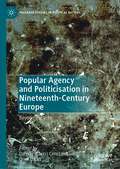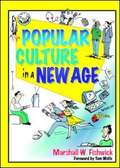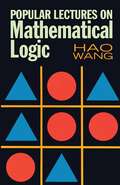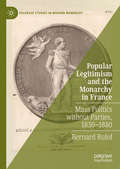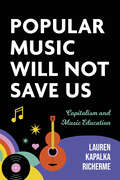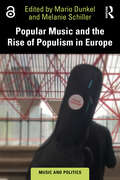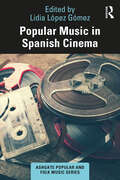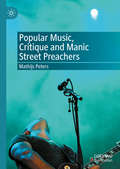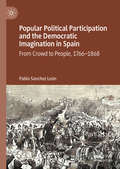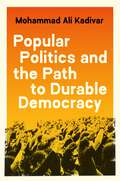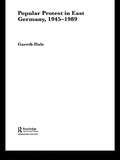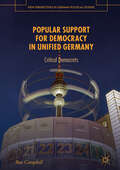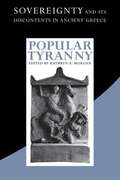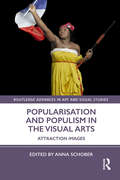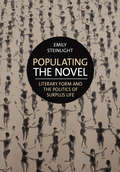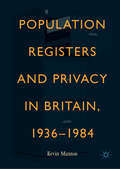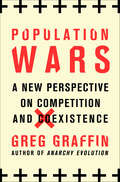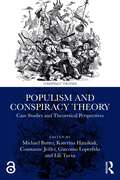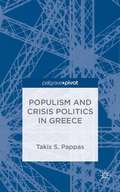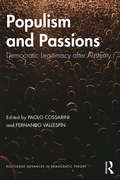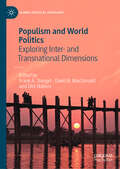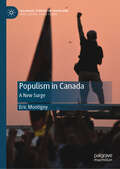- Table View
- List View
Popular Agency and Politicisation in Nineteenth-Century Europe: Beyond the Vote (Palgrave Studies in Political History)
by Diego Palacios Cerezales Oriol LujánThis book provides an entry point to the most cutting-edge lines of research on popular political mobilisation in Europe. It brings together leading scholars from Germany, France, Britain, the Netherlands and Spain. The chapters explore the connected dimensions of popular participation within different countries and across borders, covering the topics of iconoclasm, popular acclamations, street politics, associations, petitions and electoral agitation. Focusing on the role of disenfranchised citizens and women, this collection broadens the themes of traditional political historical research that has identified political participation with the right to vote and struggles for political inclusion, and brings a wide array of formal and informal political practices to the centre of nineteenth-century European life. A must-read for scholars, undergraduates, and graduate students wishing to explore multiple dimensions of the history of political engagement and politicisation.
Popular Culture in a New Age
by Marshall William FishwickFishwick (interdisciplinary studies, American studies, and popular culture studies, Virginia Tech) offers observations on popular culture in view of the changes brought about by the information revolution and the digital divide. Coverage hops about to address issues such as the millennium; distinctions between folk, fake, and pop; sacred symbols; the cult of celebrity; war; postmodern pop; and the concept of the global village, among other topics. Includes a couple of contributions by graduate students with similar snappy, stream-of-consciousness approaches.
Popular Lectures on Mathematical Logic
by Hao WangA noted logician and philosopher addresses various forms of mathematical logic, discussing both theoretical underpinnings and practical applications. Author Hao Wang surveys the central concepts and theories of the discipline in a historical and developmental context, and then focuses on the four principal domains of contemporary mathematical logic: set theory, model theory, recursion theory and constructivism, and proof theory.Topics include the place of problems in the development of theories of logic and logic's relation to computer science. Specific attention is given to Gödel's incompleteness theorems, predicate logic and its decision and reduction problems, constructibility and Cantor's continuum hypothesis, proof theory and Hilbert's program, hierarchies and unification, proof of the four-color problem, the Diophantine problem, the tautology problem, and many other subjects. Three helpful Appendixes conclude the text.
Popular Legitimism and the Monarchy in France: Mass Politics without Parties, 1830–1880 (Palgrave Studies in Modern Monarchy)
by Bernard RulofThis book explores mid-nineteenth-century French legitimism and the implications of popular support for a movement that has traditionally been portrayed as an aristocratic force intent on restoring the Old Regime. This type of monarchism has often been understood as a form of elitist patronage politics or, alternatively, identified with ultramontane Catholicism. Although historians have offered a more nuanced view in the last few decades, their work, nevertheless, has predominantly focused on legitimist leaders rather than their followers and their professed feelings of loyalty to monarchy and monarch. This book’s originality therefore is twofold: firstly as an analysis of popular rather than élite monarchism; and secondly, as a study which portrays this form of royalism as a political movement characteristic of a period which saw the emergence of mass politics, while parties were still non-existent. It not only discusses the social and cultural settings of (popular) monarchism, but also contributes to the history of political parties, citizenship and democracy.
Popular Morality in the Early Roman Empire
by Teresa MorganMorality is one of the fundamental structures of any society, enabling complex groups to form, negotiate their internal differences and persist through time. In the first book-length study of Roman popular morality, Dr Morgan argues that we can recover much of the moral thinking of people across the Empire. Her study draws on proverbs, fables, exemplary stories and gnomic quotations, to explore how morality worked as a system for Roman society as a whole and in individual lives. She examines the range of ideas and practices and their relative importance, as well as questions of authority and the relationship with high philosophy and the ethical vocabulary of documents and inscriptions. The Roman Empire incorporated numerous overlapping groups, whose ideas varied according to social status, geography, gender and many other factors. Nevertheless it could and did hold together as an ethical community, which was a significant factor in its socio-political success.
Popular Music Will Not Save Us: Capitalism and Music Education (Counterpoints: Music and Education)
by Lauren K. RichermeIn today's globalized landscapes, both traditional and progressive K–12 music education practices, including those associated with popular music, can further capitalism-related inequities. In this context, music educators and students might consider how they position themselves and their music-making practices in relation to capitalist aims and processes and confront the more unethical aspects of capitalism.Popular Music Will Not Save Us challenges music educators to rethink their philosophical stances in the face of contemporary capitalist values and explores the intersection of music education and globalized capitalism, unveiling how certain practices exacerbate material inequities and erode social responsibility. As author Lauren Kapalka Richerme unravels the complexities of music education, her analysis sheds light on how prevalent practices can inadvertently uphold capitalist ideals and reinforce individualism, unceasing accumulation, and precarity in the workforce. Given that no musical genre inherently challenges problematic aspects of capitalism, Richerme proposes that music educators instead focus on affective flows, or the circulation of sensations within pedagogical spaces, and consider four alternative positionalities: thriving within, surviving under, resisting, and challenging capitalism.Popular Music Will Not Save Us advocates for a shift away from capitalistic individualism and inequities and toward a more equitable, affective pedagogical mode. Now is the time to transcend traditional boundaries and embrace a new paradigm that prioritizes social impact over commercial gain.
Popular Music and the Rise of Populism in Europe (Music and Politics)
by Melanie Schiller Mario DunkelThis book focuses on the role of popular music in the rise of populism in Europe, centring on the music-related processes of sociocultural normalisation and the increasing prevalence of populist discourses in contemporary society. In its innovative combination of approaches drawing from (ethno)musicology, sociology, and political science, as well as media and cultural studies, this book develops a culture-oriented approach to populism. Based on shared research questions, an original theoretical framework and a combination of innovative methodologies that pay attention to the specific socio-historical contexts, taking into account musical material as well as processes of reception, the five chapters in this volume offer detailed analyses of the nexus of popular music and populism in Hungary, Italy, Austria, Sweden and Germany. All of these countries have seen a marked increase in populist parties and discourses over the last years, as well as significant interactions between populism and popular music. This book will be essential reading for those investigating popular music as a crucial aspect in the study of populism as a cultural phenomenon in Europe.The Open Access version of this book, available at http://www.taylorfrancis.com, has been made available under a Creative Commons [Attribution-Non Commercial-No Derivatives (CC-BY-NC-ND)] 4.0 license.
Popular Music in Spanish Cinema (Ashgate Popular and Folk Music Series)
by Lidia López GómezPopular Music in Spanish Cinema analyses the aesthetics and stylistic development of soundtracks from national productions, considering how political instability and cultural diversity in Spain determined the ways of making art and managing culture. As a pioneering study in this field, the chronologically structured approach of this book provides readers with a complete overview of Spanish music and connects it to the complex historical events that conditioned Spanish culture throughout the 20th century to the present day, from the Second Republic, the Spanish Civil war, and the dictatorship through to democracy. The book enables an understanding of the relationships between the recording and film production industries, the construction of collective imagination, the formulation of new stereotypes, semiotic meanings within film music and the musical exchanges between national and international cinema. This volume is an essential read for students and academics in the field of musicology, ethnomusicology and history as well as those interested in the study of diverse musical styles such as copla, zarzuela, flamenco, jazz, foxtrot, pop and rock and how they have been used in Spanish films throughout history.
Popular Music, Critique and Manic Street Preachers
by Mathijs PetersThis book explores the ways in which popular music can criticise political, social and economic structures, through the lens of alternate rock band Manic Street Preachers. Unlike most recent work on popular music, Peters concentrates largely on lyrical content to defend the provocative claim that the Welsh band pushes the critical message shaped in their lyrics to the forefront. Their music, this suggests, along with sleeve art, body-art, video-clips, clothes, interviews and performances, serves to emphasise this critical message and the primary role played by the band’s lyrics. Blending the disciplines of popular music studies, culture studies and philosophy, Peters confronts the ideas of German philosopher and social critic Theodor W. Adorno with the entire catalogue of Manic Street Preachers, from their 1988 single ‘Suicide Alley’ to their 2018 album Resistance is Futile. Although Adorno argues that popular music is unable to resist the standardising machinery of consumption culture, Peters paradoxically uses his ideas to show that Manic Street Preachers releases shape ‘critical models’ with which to formulate social and political critique. This notion of the ‘critical model’ enables Peters to argue that the catalogue of Manic Street Preachers critically addresses a wide range of themes, from totalitarianism to Holocaust representation, postmodern temporality to Europeanism, and from Nietzsche’s ideas about self-overcoming to reflections on digimodernism and post-truth politics. The book therefore persuasively shows that Manic Street Preacher lyrics constitute an intertextual network of links between diverse cultural and political phenomena, encouraging listeners to critically reflect on the structures that shape our lives.
Popular Political Participation and the Democratic Imagination in Spain: From Crowd to People, 1766-1868
by Pablo Sánchez LeónThis book addresses the changing relationships among political participation, political representation, and popular mobilization in Spain from the 1766 protest in Madrid against the early Bourbon reforms until the citizen revolution of 1868 that first introduced universal suffrage and led to the ousting of the monarchy. Popular Participation and the Democratic Imagination in Spain shows that a notion of the “crowd” internally dividing the concept of “people” existed before the advent of Liberalism, allowing for the enduring subordination of popular participation to representation in politics. In its wider European and colonial American context, the study analyzes semantic changes in a range of cultural spheres, from parliamentary debate to historical narrative and aesthetics. It shows how Liberalism had trouble reproducing the legitimacy of limited suffrage and traces the evolution of an imagination on democracy that would allow for the reconfiguration of an all-encompassing image of the people eventually overcoming representative government.“Focused on the nation and identities, Spanish historiography had a pending debt with that other historical subject of modernity, the people. With this book, Pablo Sánchez León starts cancelling the debt with an innovative methodology combining conceptual history with social and political history. Brilliantly, this books also proposes a novel chronology for modern history and renewed categories of analysis. In many senses, this is an extraordinarily renovating senior work.”—José María Portillo Valdés, University of the Basque Country, Spain “This book by Pablo Sánchez León is an original and detailed study of one of the essential components of modernity, the relation between the concepts of plebe and pueblo. The author shows that plebe and people were shaped in a process of mutual differentiation and how the enduring tension between them deeply marked out the evolution of Spanish politics from the end of the Old Regime and throughout the 19th century. As the author brilliantly argues, such tension is tightly imbricated with the enduring dilemma between representation and participation underlying modern political systems. Through a historical analysis of the influence of people and plebe over Spanish, the book makes clear the degree to which the power of language contributes to shape political actors and institutional frames.”—Miguel Ángel Cabrera — Professor, University of La Laguna, Tenerife, Spain “Most accounts of Spain’s transition to modern democracy begin with the popular uprising against the French invasion in 1808, the creation of a national parliament and the promulgation of an advanced Liberal constitution in 1812. Pablo Sánchez León begins the story half a century earlier in the mass street protests in Madrid and other cities in 1766 sparked by Charles III’s sweeping reform programme. Sánchez León focuses unrepentantly on plebeian groups and crowd action – how they are described and conceived by contemporaries – as a key to understanding Spain’s precocious and troubled passage from absolutism to the promulgation of universal male suffrage in September 1868. This audacious and highly original interpretation will surely strike a chord with students of modern Spain.”—Guy Thomson, University of Warwick, UK “This is a book for exploring (from current needs) the history of political participation in Spanish society in order to rethink the very notion of modern citizenship.”—María Sierra, University of Seville, Spain “Motivated by the current crisis in political representation in parliamentary democracies, this work by Pablo Sánchez León departs from the process of construction of modern citizenship. Representation, participation and mobilization are put into play as an interactive triad whose dynamics and changing conceptualization have the key to the social, political and cultural chang
Popular Politics and the Path to Durable Democracy (Princeton Studies In Global And Comparative Sociology Ser.)
by Mohammad Ali KadivarA groundbreaking account of how prolonged grassroots mobilization lays the foundations for durable democratizationWhen protests swept through the Middle East at the height of the Arab Spring, the world appeared to be on the verge of a wave of democratization. Yet with the failure of many of these uprisings, it has become clearer than ever that the path to democracy is strewn with obstacles. Mohammad Ali Kadivar examines the conditions leading to the success or failure of democratization, shedding vital new light on how prodemocracy mobilization affects the fate of new democracies.Drawing on a wealth of new evidence, Kadivar shows how the longest episodes of prodemocracy protest give rise to the most durable new democracies. He analyzes more than one hundred democratic transitions in eighty countries between 1950 and 2010, showing how more robust democracies emerge from lengthier periods of unarmed mobilization. Kadivar then analyzes five case studies—South Africa, Poland, Pakistan, Egypt, and Tunisia—to investigate the underlying mechanisms. He finds that organization building during the years of struggle develops the leadership needed for lasting democratization and strengthens civil society after dictatorship.Popular Politics and the Path to Durable Democracy challenges the prevailing wisdom in American foreign policy that democratization can be achieved through military or coercive interventions, revealing how lasting change arises from sustained, nonviolent grassroots mobilization.
Popular Protest in East Germany: Judgements On The Street (Routledge Advances in European Politics)
by Gareth DaleAn incisive new study of dissent and protest in the German Democratic Republic, focusing on the upheaval of 1989-1990. The author, an active participant both in the 'Citizens' Movement' and in the street protests of that year, draws upon a vast array of sources including interviews, documents from the archives of the old regime and the Citizens' Movement and his own diary entries, to explore the causes and processes of the East German revolution. The book is at once a lucid and vibrant narrative history and a pioneering contribution to research in this field.
Popular Support for Democracy in Unified Germany: Critical Democrats (New Perspectives in German Political Studies)
by Ross CampbellThis book examines attitudes towards democracy in the Federal Republic of Germany. By drawing on extensive survey evidence, it charts Germans’ changing views of the political system prior to and following unification. The study examines four aspects of the political system: how it functions overall, attitudes towards the Basic Law, trust in representative institutions, and views of the European Union. Rather than accepting or rejecting democracy, the research shows how Germans merge shades of criticism and support. In addition, it pinpoints the factors that condition support, showing how it is influenced by durable and changeable stimuli. Overall, the findings challenge suggestions of a crisis of democracy but they also demonstrate that support is particularly low towards aspects of the European Union. This book appeals to readers interested in public opinion and democracy in Germany, along with those interested in the changing relationship between citizens and the state.
Popular Tyranny: Sovereignty and Its Discontents in Ancient Greece
by Morgan Kathryn A.The nature of authority and rulership was a central concern in ancient Greece, where the figure of the king or tyrant and the sovereignty associated with him remained a powerful focus of political and philosophical debate even as Classical Athens developed the world's first democracy. This collection of essays examines the extraordinary role that the concept of tyranny played in the cultural and political imagination of Archaic and Classical Greece through the interdisciplinary perspectives provided by internationally known archaeologists, literary critics, and historians.<P><P>The book ranges historically from the Bronze and early Iron Age to the political theorists and commentators of the middle of the fourth century B.C. and generically across tragedy, comedy, historiography, and philosophy. While offering individual and sometimes differing perspectives, the essays tackle several common themes: the construction of authority and of constitutional models, the importance of religion and ritual, the crucial role of wealth, and the autonomy of the individual. Moreover, the essays with an Athenian focus shed new light on the vexed question of whether it was possible for Athenians to think of themselves as tyrannical in any way. As a whole, the collection presents a nuanced survey of how competing ideologies and desires, operating through the complex associations of the image of tyranny, struggled for predominance in ancient cities and their citizens.
Popular sovereignty in historical perspective
by Quentin Skinner Richard Bourke Bourke, Richard and Skinner, QuentinThis collaborative volume offers the first historical reconstruction of the concept of popular sovereignty from antiquity to the twentieth century. First formulated between the late sixteenth and mid-seventeenth centuries, the various early modern conceptions of the doctrine were heavily indebted to Roman reflection on forms of government and Athenian ideas of popular power. This study, edited by Richard Bourke and Quentin Skinner, traces successive transformations of the doctrine, rather than narrating a linear development. It examines critical moments in the career of popular sovereignty, spanning antiquity, medieval Europe, the early modern wars of religion, the revolutions of the eighteenth century and their aftermath, decolonisation and mass democracy. Featuring original work by an international team of scholars, the book offers a reconsideration of one of the formative principles of contemporary politics by exploring its descent from classical city-states to the advent of the modern state.
Popularisation and Populism in the Visual Arts: Attraction Images (Routledge Advances in Art and Visual Studies)
by Anna SchoberThis book investigates the pictorial figurations, aesthetic styles and visual tactics through which visual art and popular culture attempt to appeal to "all of us". One key figure these practices bring into play—the "everybody" (which stands for "all of us" and is sometimes a "new man" or a "new woman")—is discussed in an interdisciplinary way involving scholars from several European countries. A key aspect is how popularisation and communication practices—which can assume populist forms—operate in contemporary democracies and where their genealogies lie. A second focus is on the ambivalences of attraction, i.e. on the ways in which visual creations can evoke desire as well as hatred.
Populating the Novel: Literary Form and the Politics of Surplus Life
by Emily SteinlightFrom the teeming streets of Dickens’s London to the households of domestic fiction, nineteenth-century British writers constructed worlds crammed beyond capacity with human life. In Populating the Novel, Emily Steinlight contends that rather than simply reflecting demographic growth, such pervasive literary crowding contributed to a seismic shift in British political thought. She shows how the nineteenth-century novel in particular claimed a new cultural role as it took on the task of narrating human aggregation at a moment when the Malthusian specter of surplus population suddenly and quite unexpectedly became a central premise of modern politics.In readings of novels by Mary Shelley, Elizabeth Gaskell, Charles Dickens, Mary Braddon, Thomas Hardy, and Joseph Conrad that link fiction and biopolitics, Steinlight brings the crowds that pervade nineteenth-century fiction into the foreground. In so doing, she transforms the subject and political stakes of the Victorian novel, dislodging the longstanding idea that its central category is the individual by demonstrating how fiction is altered by its emerging concern with population. By overpopulating narrative space and imagining the human species perpetually in excess of the existing social order, she shows, fiction made it necessary to radically reimagine life in the aggregate.
Population Registers and Privacy in Britain, 1936—1984
by Kevin MantonThis book examines the fraught political relationship between British governments, which wanted information about peoples’ lives, and the people who desired privacy. To do this it looks at something that Britain only experienced in wartime, a centralized and up-to-date list of everyone in the country: a population register. The abolition of this wartime system is contrasted with later attempts to reintroduce registration, and the change in the political mind-set driving these later schemes to develop centralised webs of so-called objective data is examined. These policies were confronted by privacy campaigns, studied here, but it is shown how government responses succeeded in turning political debates about data into technical discussions about computerization; thus protecting its data, largely on paper, from oversight. This reformulation also shaped the 1984 Data Protection Act, which consequently did not protect privacy but rather increased government’s ability to gain knowledge of, and hence power over, the people.
Population Wars: A New Perspective on Competition and Coexistence
by Greg GraffinFrom the very beginning, life on Earth has been defined by war. Today, those first wars continue to be fought around and literally inside us, influencing our individual behavior and that of civilization as a whole. War between populations - whether between different species or between rival groups of humans - is seen as an inevitable part of the evolutionary process. The popular concept of "the survival of the fittest" explains and often excuses these actions.In Population Wars, Greg Graffin points to where the mainstream view of evolutionary theory has led us astray. That misunderstanding has allowed us to justify wars on every level, whether against bacterial colonies or human societies, even when other, less violent solutions may be available. Through tales of mass extinctions, developing immune systems, human warfare, the American industrial heartland, and our degrading modern environment, Graffin demonstrates how an over-simplified idea of war, with its victorious winners and vanquished losers, prevents us from responding to the real problems we face. Along the way, Graffin reveals a paradox: when we challenge conventional definitions of war, we are left with a new problem, how to define ourselves. Populations Wars is a paradigm-shifting book about why humans behave the way they do and the ancient history that explains that behavior. In reading it, you'll see why we need to rethink the reasons for war, not only the human military kind but also Darwin's "war of nature," and find hope for a less violent future for mankind.
Populism and Conspiracy Theory: Case Studies and Theoretical Perspectives (Conspiracy Theories)
by Michael Butter Giacomo Loperfido Katerina Hatzikidi Constanze Jeitler Lili TurzaThis book explores the close connections between populism and conspiracy theory. Populism and Conspiracy Theory contributes to filling the gap in the research in this area. The individual contributions in Part I provide in-depth analyses of specific configurations of populism and conspiracy theory. Part II includes nuanced considerations of more theoretical issues. The case studies cover both right-wing and left-wing manifestations of populism, while highlighting that populist movements often cut across the traditional left-right divide. Chapters focus on the twenty-first century and the first half of the twentieth century, as well as the impact of history and memory on contemporary discourses. Geographically, the case studies consider the Americas as well as Europe and Northern Africa. Theoretical discussions include the aesthetics and forms of populist conspiracism, or its dependence on new media. The disciplines represented in the volume range from political science and sociology via anthropology and history to linguistics and cultural studies.It will appeal to those interested in politics, specifically conspiracy theory, populism, democracy, and leadership.The Open Access version of this book, available at www.taylorandfrancis.com, has been made available under a Creative Commons Attribution‑Non Commercial‑No Derivatives (CC‑BY‑NC‑ND) 4.0 license.
Populism and Crisis Politics in Greece
by Takis S. PappasExploring the negative effects of populism, this study presents an original explanation of Greece's current political and economic failures. It argues that the sovereign debt crisis only exacerbated the malfunctioning of a democracy long ago contaminated by populist politics while also offering a more general insight into the impact of populism
Populism and Passions: Democratic Legitimacy after Austerity (Routledge Advances in Democratic Theory)
by Paolo Cossarini Fernando VallespínThere is a consensus that right, and left-wing populism is on the rise on both sides of the Atlantic, from Donald Trump in the United States, to Spain’s leftist Podemos. These may utilize different kinds of populist mobilizations but the fact remains that elite and mass opinion is fuelling a populist backlash. In Populism and Passions, twelve scholars engage with discourse analysis, democratic theory, and post structural political thought to study the political logic of passion for contemporary populism. Together these interdisciplinary essays demonstrate what emotional engagement implies for the spheres of politics and the social, and how it governs and mobilizes individuals. The volume presents: Theoretical and empirical implications for political analysis; Chapters on the current rise of populism, both right and left-wing trends, their different ideological features, and their relationship with the logic of passion; Theoretical implications for the future study of populism and democratic legitimacy. A timely analysis of this political phenomena in contemporary Western democracies, Populism and Passions is ideal for students and scholars in political theory, comparative politics, social theory, critical theory, cultural studies, and global studies.
Populism and World Politics: Exploring Inter- and Transnational Dimensions (Global Political Sociology)
by Frank A. Stengel David B. MacDonald Dirk NabersThis volume is the first to analyze populism’s international dimension: its impact on, and interaction with, foreign policy and international politics. The contributions to this volume engage conceptual theoretical issues and overarching questions such as the still under-specified concept of populism or the importance of leadership and the mass media for populism’s global rise. They zoom in on populism’s effect on both different countries’ foreign policies and core international concerns, including the future of the liberal world order and the chances for international conflict and cooperation more generally.
Populism in Canada: A New Surge (Palgrave Studies in Populisms)
by Eric MontignyFor the first time in modern Canadian history, the leader of one of the two governing party was chosen on a decidedly populist platform. Before the election of Pierre Poilievre as leader of the Conservative Party, many believed that Canada was immune to populism. In the months following his arrival as leader of the Official opposition, the polls in his favor soared. So much so, that it prompted Prime minister Justin Trudeau's resignation. The success of Poilievre&’s stand in favor of the working class also forced the main left-wing party, the NPD, to adopt an even more populist tone. Does Pierre Poilievre's populism come from Donald Trump's playbook? Are the 2022 truckers' occupation of Ottawa and the post-Covid pandemic inflationary context explanatory factors? This new populism made in Canada is essentially economic, with no nativist component. But its first victims were carbon pricing policies to combat climate change. From a global perspective, what lessons can we draw from this shift in Canadian politics?
Populism in Europe and the Americas
by Cristóbal Rovira Kaltwasser Cas MuddeAlthough 'populism' has become something of a buzzword in discussions about politics, it tends to be studied by country or region. This is the first book to offer a genuine cross-regional perspective on populism and its impact on democracy. By analyzing current experiences of populism in Europe and the Americas, this edited volume convincingly demonstrates that populism can be both a threat and a corrective to democracy. The contributors also demonstrate the interesting similarities between right-wing and left-wing populism: both types of populism are prone to defend a political model that is not against democracy per se, but rather at odds with liberal democracy. Populism in Europe and the Americas offers new insights into the current state of democracy from both a theoretical and an empirical point of view.
